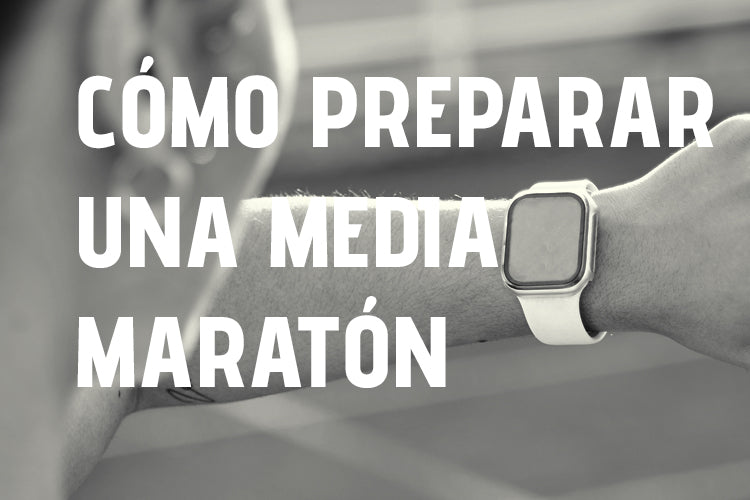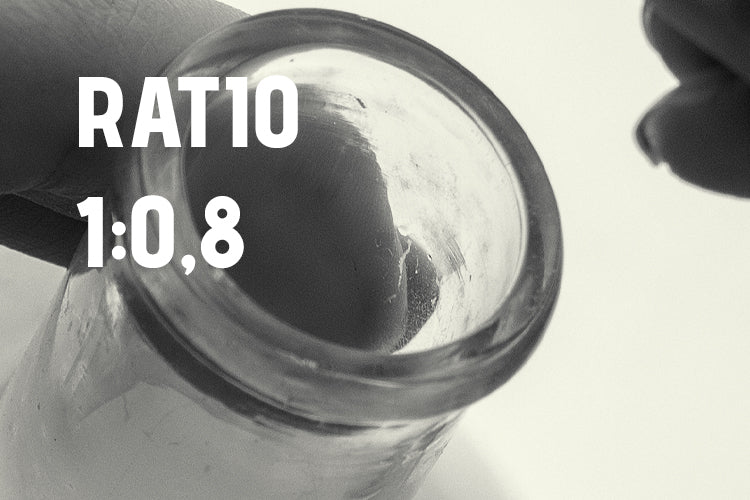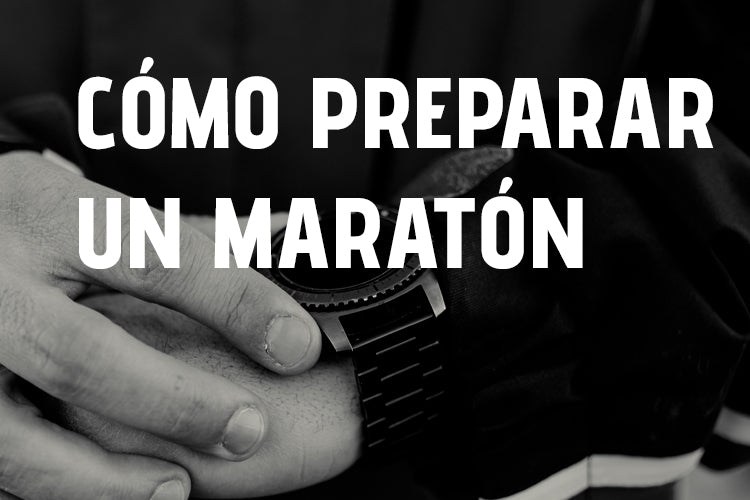The half marathon is the race every athlete wants to pursue when it comes to their first competition.
But before getting into the details, if you're also running a marathon, I recommend reading this guide, which explains some of the differences with respect to the half marathon. Click here
It's a distance in which glycogen stores are greatly affected, as the race lasts for over an hour, so proper sports nutrition intake during the race is essential to finish in good condition.
Before you start training, you should know that you're going to subject your body to a large volume of kilometers and stress, hence the importance of knowing that your body will be prepared for it. In addition, your body will be subjected to stress that will require you to recover well after each workout. Not only is it important to eat before training, during the day, or during training, but also post-workout preparation is vital if we want to progress. With the Glycogen Recovery Drink , you'll get the right amount of carbohydrates and proteins, as we've explained in previous guides on How to Recover. to help you assimilate training to training and thus be able to add more weekly training volume without losing performance or increasing the chances of injury.
Periodized nutrition
What do we mean by periodized nutrition?
This term isn't very common among amateur runners, but it's increasingly common among those who regularly run races like half marathons. Periodized nutrition is simply giving your body what it needs at different times during the season. As nutritionists, we should be aware that both amateur and professional runners have completely different requirements between a training volume phase and a specific intensity phase.
That's why, just as we emphasize the 1:0.8 ratio or the maximum tolerable carbohydrate concentration in the energy drinks in all our products, science also has something to say about it.
The adaptive response to physical training is determined by a combination of factors:
-the duration
-the intensity
-the type of exercise
-the frequency of training
-the quality and quantity of nutrition before and after exercise
It is becoming increasingly clear that adaptations initiated by exercise can be amplified or attenuated by nutrition. For example, it is well established that in the absence of protein feeding after exercise, net protein synthesis is low and muscle can actually be in negative protein balance, preventing proper recovery.
There is also evidence that reducing carbohydrate availability can promote specific adaptations in muscle. Conversely, supplementation with high doses of antioxidants has the potential to reduce training adaptations [ 1 , 23 ].
During certain training periods there is a focus on weight management and lower energy intake such as pre-season, whereas during other periods such as volume or intensity specific mesocycles there is a focus on recovery and performance and higher carbohydrate intake. Mujika et al. [ 4 ] concluded that “nutrition should be periodized and tailored to support changes in individual goals, training levels and requirements throughout a season and/or training cycle.”
Hawley and Burke [ 5] discussed the importance of a long-term periodized training and nutrition program as a way to improve performance. The authors stated that “…it seems interesting to suggest that competitive or amateur athletes may manipulate carbohydrate availability before, during, or after selected training sessions that are part of a long-term periodized training-nutrition plan to promote metabolic adaptations to training.” In this statement, there is a strong focus on carbohydrate availability as a driver of training effects.
PRE-SEASON NUTRITIONAL REQUIREMENTS
It is important to clarify that the preseason is a time of year where every athlete uses it to rest psychologically from competitions or simply reduce their sporting activity due to extra-sporting commitments or vacations.
These are times when the body doesn't require a high intake of carbohydrates or proteins. Furthermore, glycogen stores are typically depleted due to the lack of muscle stimulation. Therefore, it's important to monitor the intake of at least the macronutrients throughout the day.
Carbohydrates: 2.5 to 3.5 grams/kg/day
Proteins: 1 gram/kg/day
Fats: 0.7 grams/kg/day
If you don't know how to calculate your daily calories, you can check out the currently popular macronutrient calculator apps to track your daily intake. After a few weeks, you'll know and control your intake without having to use an app.
SEASONAL REQUIREMENTS (SPECIFIC MESOCYCLE 1 AND 2) VOLUME AND INTENSITY
During these times, the body primarily needs to consume slow- and fast-assimilating carbohydrates. This means that your diet should focus on complex foods, such as whole-wheat pasta or brown rice, during off-workout hours, and simple carbohydrates, such as white rice, white pasta, white bread, jam, etc., during off-workout hours.
That is, the diet should consist of fruits and vegetables to maintain high levels of minerals and vitamins, but with an emphasis on foods high in carbohydrates.
Carbohydrates: 6 to 9 grams/kg/day
Protein: 1 to 1.4 grams/kg/day
Fats: 0.5 to 0.7 grams/kg/day
COMPETITION REQUIREMENTS
In competition, or the week before a competition, one thing must be clear: without carbohydrates, a person cannot perform at their best. This is something that pseudoscience has recently emphasized, as fats are the most beneficial substrate for endurance sports. We've already made this clear in our ketogenic diet and performance guide , so we won't enter into the debate.
Competition-like workouts, intensity, or duration. You should use this type of daily macronutrient distribution to ensure you meet your needs.
Carbohydrates: 7 to 12 grams/kg/day
Protein: 0.8 to 1 gram/kg/day
Fats: 0.5 to 0.7 grams/kg/day
It should be noted that the difference in distribution between the pre-competition day and the day you do specific training similar to the competition is that on the first day you should follow a diet with almost no fiber ( tapering, learn more about how to prepare a tapering the day before ) and on the second day you can ingest some fiber and a little more protein since you will train on this day and not the day before the competition.

1 SAME EXAMPLE WITH DIFFERENT PROPORTIONS

HOW TO MANAGE PRE-COMPETITION NUTRITION?
In previous guides, we've explained how to taper, so if you have any questions about what to eat the day before, read this guide before continuing.
Because tapering in a half marathon is even more interesting than in a marathon. Mainly for two reasons:
The first thing that the athlete does when he is going to do 1 hour of training is sometimes that he does not consume anything so the energy is exclusively obtained from glycogen, the energy par excellence that we obtain through tapering.
And secondly, in a half marathon, our reserves could be depleted in just 40 minutes due to the intensity at which it is run, compared to a marathon.
We will focus on what, how and how much to eat for breakfast before a half marathon.
It's important to eat a good breakfast on race day. Too much or the wrong foods can cause stomach upset. And too little can leave you feeling sluggish prematurely. Science can provide some guidance on carbohydrate and other nutrient intake, but much depends on individual preferences. Let's look at several important factors to consider when planning your breakfast on race day...
Carbohydrates are the most important macronutrient to include in your breakfast on race day because your body will rely heavily on them as a fuel source during the race. The body can only store a limited amount of glycogen in the liver, and overnight liver glycogen stores are substantially depleted (6). Therefore, consuming simple carbohydrates in the hours leading up to the marathon is crucial.
It is recommended to consume 1–4 grams of carbohydrate per kg of body mass in the 1–4 hours prior to exercise (7). This is a fairly wide range, which can lead to a variety of scenarios. For example, one person might consume 1 g/kg of carbohydrate 4 hours before a race, while another might consume 4 g/kg of carbohydrate 1 hour before the race, and both would meet the recommendations. It seems to make sense to consume a larger meal if there is more time before the start and a smaller meal if there is less time available.
Each person varies in how much and when they consume carbohydrates before a race, and recommendations should therefore be tailored to their individual preferences. Carbohydrate-rich foods include toast, bagels, porridge, cereal, rice, pancakes, granola bars, and bananas.
If you struggle to digest food before a race, even when you leave a significant gap between eating and running, try liquid forms of carbohydrates. For example, a sports drink like our GLUT 5 DRINK carbohydrate drink or a commercial shake. Both solid and liquid forms of carbohydrates similarly promote glycogen resynthesis after an overnight fast, making them equally suitable options (8).

Foods to avoid or limit?
Certain foods can increase the likelihood of stomach upset during a race, particularly fiber. This is because fiber takes longer to digest, which can mean it may still be in your stomach when you're at the start line. Carbohydrates with a lower glycemic index (GI) tend to have a higher fiber content. Therefore, reducing low-GI carbohydrates in your pre-race breakfast may alleviate symptoms (if you're prone to them), for example, whole-wheat bread, bran flakes, oat flakes, muesli, rye bread.
Consuming too much fat before the race can also cause intestinal problems because it slows the rate at which food empties from the stomach (8). Ideally, when the race starts, the carbohydrates from breakfast should be stored and not still in the stomach. A high-fat breakfast can include bacon, sausage, cheese, and pastries. Of course, the longer the time between breakfast and the race start, the less important this will be.
DURING THE HALF MARATHON
We'll focus on carbohydrates, hydration, and salts in a general sense. As we've discussed in previous guides, each athlete should individualize the three key points: carbohydrates, salts, and water. In just two weeks, we'll have the Half Marathon Pack available, just like the Marathon Pack , which is already available. It will provide you with everything you need for race day—pre-, during, and post-race—with a strategy sticker that will help you follow the strategy throughout the half marathon and ensure you never forget what you should eat or drink.
Carbohydrates:
Individualization is the key to success, but every athlete should consume between 40 and 60 grams of carbohydrates per hour during a marathon, or at least one 60-gram gel per hour. That is, if the half marathon lasts two hours, you should consume two 60-gram gels in total.
If we go beyond the basic carbohydrate requirements per hour, an athlete who manages to consume more than 60 grams of carbohydrates per hour throughout the season will be very effective in improving performance. Speaking of performance, an athlete who has trained their stomach to consume 70 to 80 grams of carbohydrates per hour during a marathon will likely be able to improve their time more easily than an athlete who consumes the recommended minimum.
In this case, you could use another strategy with the Hydro Gel 35 Strawberry and Banana . One serving every 30 minutes will provide the athlete with 70 grams of carbohydrates per hour and 400 mg of sodium. This ensures both sodium and carbohydrates are covered at all times, providing energy for the entire event.
Hydration
Regarding hydration, athletes should consume at least 300 to 550 ml of water per hour to compensate for losses caused by sweating.
But for distances like the half marathon, where most athletes run under an hour and a half, there's no need to include a 500-meter soft flash or 250-meter soft flash with water. Just hydration at the refreshment points. To reach the finish line with more than 3% dehydration, we'd have to lose more than 1 liter per hour, and depending on the time of year, that wouldn't be necessary.
However, if you're an athlete who sweats a lot and knows you could lose more than 3% of your body weight in sweat during the event, we recommend calculating your sweat rate. Here's a guide on how to calculate it : How to calculate your dehydration rate? You can download this FANTÉ calculator, created by our nutritionists, to help you calculate your optimal hourly water intake in a simple and easy way.
With the aim of knowing how much hydration you would need in a half marathon.
Salts
During a half marathon or any endurance event, we should consume at least 350 to 450 mg of sodium per hour, as this is the minimum amount of sodium our body needs to maintain osmotic balance.
For this reason, FANTÉ has created the Gel 60 range, with which you can consume 60 grams of carbohydrates and 350 mg of sodium per hour with 1 gel, the minimum amount per hour you need to perform at your best.
On the other hand, if you're an athlete for whom texture is a priority, we've created the Gel Hydro 35 range, specifically for trail running and running. Thanks to its liquid texture, the gels are easier to ingest and more easily assimilated. Both ranges provide the minimum sodium requirement per hour and the minimum amount of carbohydrates per hour needed for your body to perform at its best.
Caffeine
Before explaining how we should manage caffeine consumption, we recommend that you read our guide on caffeine replenishment , in which we explain how we should ingest caffeine during long-distance and middle-distance events.
For a half marathon, caffeine is an essential supplement if we want to perform at our best. It's the supplement with the most scientific evidence behind it.
If the test lasts up to 1:30h
The athlete should only consume 1 60-caff pre-race gel 10 minutes before the start.
If the test lasts more than 1:30h
The athlete must consume 1 caff pill or 1 60 caf f gel 15' pre before the start and 1 glut 5 lite 100CAFF gel at 1:20 a.m.
EXAMPLE OF NUTRITIONAL STRATEGY
If you want a personalized strategy tailored to your professional and personal conditions, your training level, and your nutritional level, our new Nutritional Consulting is an innovative product never before seen in nutrition brands. Our nutritionists will create a personalized and specific strategy for you. You'll receive a PDF with the entire strategy and a video with our nutritionists explaining every detail of the strategy firsthand, so you have no doubts.
If you prefer a specific half marathon package, it will be available on our website in a few weeks.
If you prefer a pre-designed and pre-planned marathon package, get our MARATHON package . Depending on your fitness level, you can choose Level 1, Level 2, or Level 3. Depending on the level you choose, you'll have a different strategy. The goal is to customize the package as much as possible and ensure each athlete is in the best condition on race day.
Likewise, here we leave you a general example that meets all the conditions explained above.

Literature
- Paulsen G, Cumming KT, Holden G, et al. Vitamin C and E supplementation hinders cellular adaptation to resistance training in humans: a double-blind, randomized, controlled trial. J Physiol. 2014;592:1887–901
- Paulsen G, Hamarsland H, Cumming KT, et al. Vitamin C and E supplementation alters protein signaling after a resistance training session but not muscle growth during 10 weeks of training. J Physiol. 2014;592:5391–408.
- Morrison D, Hughes J, Della Gatta PA, et al. Vitamin C and E supplementation prevents some cellular adaptations to resistance training in humans. Free Radical Biol Med. 2015;89:852–62
- Mujika I, Stellingwerff T, Tipton K. Nutrition and training adaptations in aquatic sports. Int J Sport Nutr Exerc Metab. 2014;24:414–24.
- Hawley JA, Burke LM. Carbohydrate availability and adaptation to training: effects on cellular metabolism. Exerc Sport Sci Rev. 2010;38:152–60.
- Rothman DL, Magnusson I, Katz LD, Shulman RG, Shulman GI. Quantification of hepatic glycogenolysis and gluconeogenesis in fasting humans with 13C NMR. Science (80- ). 1991
- Thomas DT, Erdman KA, Burke LM. Position statement of the Academy of Nutrition and Dietetics, Dietitians of Canada, and the American College of Sports Medicine: Nutrition and Athletic Performance. J Acad Nutr Diet. 2016;116(3):501–28.
- Keizer HA, Kuipers H, van Kranenburg G, Geurten P. Influence of liquid and solid meals on muscle glycogen resynthesis, plasma fuel hormone response, and maximal physical work capacity. International Sports Medicine J. 1987;
- Gentilcore D, Chaikomin R, Jones KL, Russo A, Feinle-Bisset C, Wishart JM, et al. Effects of fat on gastric emptying and glycemic, insulin, and incretin responses to a carbohydrate meal in type 2 diabetes. J Clin Endocrinol Metab. 200




Leave a comment
This site is protected by hCaptcha and the hCaptcha Privacy Policy and Terms of Service apply.